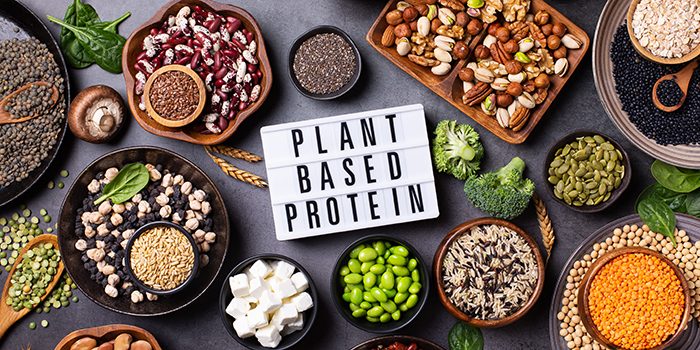Plant-Based Protein: In recent years, there has been a surge in the popularity of plant-based diets, driven by growing awareness of health, environmental, and ethical concerns. As more people explore vegan and vegetarian lifestyles, the question of how to obtain sufficient protein without relying on animal products becomes increasingly important. Fortunately, the plant kingdom offers a wealth of protein-rich foods that can meet and exceed nutritional needs. This article will explore 15 of the best plant-based protein sources, highlighting their unique benefits and how to incorporate them into your diet.
Understanding the Importance of Protein

Protein is an essential macronutrient that plays a vital role in numerous bodily functions. It is the building block of tissues, enzymes, hormones, and antibodies. Adequate protein intake is crucial for muscle growth and repair, immune function, and overall health maintenance. While animal products have long been considered the primary protein source, plants can provide complete and high-quality protein when consumed strategically.
Top 10 Plant-Based Protein Sources

- Soybeans: Soybeans are a nutritional powerhouse, offering a remarkable 37.8 grams of protein per 100 grams. As a complete protein, soybeans contain all nine essential amino acids, making them an invaluable addition to any plant-based diet.
- Tofu: Tofu, derived from soy milk, is celebrated for its versatility and impressive protein content, boasting 14 grams of protein per 100 grams. Its neutral flavor allows it to absorb the flavors of accompanying ingredients, making it suitable for diverse culinary applications. Tofu is also low in saturated fat and rich in iron and calcium.
- Tempeh: Made from fermented soybeans, tempeh stands out with 20.7 grams of protein per 100 grams. The fermentation process enhances its digestibility and nutritional profile.
- Lentils: Lentils are a nutritional staple, providing 24.35 grams of protein per 100 grams. They are also packed with dietary fiber, iron, folate, and other essential nutrients.
- Chickpeas: Chickpeas, also known as garbanzo beans, offer 18.77 grams of protein per 100 grams. They are versatile legumes that can be used in various dishes, from salads to curries.
- Kidney Beans: Kidney beans, or rajmah, provide 19.9 grams of protein per 100 grams. They are an excellent source of plant-based protein and various essential nutrients.
- Green Gram (Moong): Green gram, also known as moong, contains 22.53 grams of protein per 100 grams. It is a versatile legume that can be used in both sweet and savory dishes.
- Quinoa: Quinoa is a complete protein, containing 13.11 grams of protein per 100 grams. It is also a good source of fiber, iron, and magnesium.
- Oats: Oats provide 13.6 grams of protein per 100 grams. They are a versatile grain that can be enjoyed as a breakfast staple or incorporated into various recipes.
- Hemp Seeds: Hemp seeds are a complete protein source, offering 30 grams of protein per 100 grams. They are also rich in essential fatty acids and minerals.
- Chia Seeds: Chia seeds offer 18-20 grams of protein per 100 grams and are a complete protein source. They are also rich in fiber and omega-3 fatty acids.
- Flaxseeds: Flaxseeds contain 18.55 grams of protein per 100 grams and are an excellent source of omega-3 fatty acids and fiber.
- Sunflower Seeds: Sunflower seeds provide 23.53 grams of protein per 100 grams. They are also rich in healthy fats, vitamin E, and magnesium.
- Peanuts: Peanuts offer 23.65 grams of protein per 100 grams. They are a convenient and affordable source of plant-based protein.
- Almonds: Almonds contain 18.41 grams of protein per 100 grams and are a good source of healthy fats, vitamin E, and magnesium.
Incorporating Plant-Based Protein into Your Diet

- Variety is Key: To ensure you obtain all essential amino acids, consume a diverse range of plant-based protein sources throughout the day.
- Combine Foods: Pair incomplete proteins, such as beans and rice, to create a complete protein profile.
- Read Labels: Pay attention to nutrition labels to understand the protein content of different foods and make informed choices.
- Get Creative in the Kitchen: Experiment with different recipes and cooking methods to incorporate plant-based protein sources into your meals.
Also Read : What Are The Vegan Diet Advantages For Health?
Conclusion
Obtaining sufficient protein on a plant-based diet is not only possible but also offers numerous health benefits. By incorporating a variety of protein-rich plant foods into your daily meals, you can meet your nutritional needs, support your overall health, and enjoy the diverse flavors and textures that the plant kingdom has to offer.
Frequently Asked Questions
What are complete proteins?
Complete proteins contain all nine essential amino acids that the body cannot produce on its own.
How much protein do I need daily?
The recommended daily protein intake varies depending on factors such as age, sex, activity level, and overall health. A general guideline is 0.8 grams of protein per kilogram of body weight.
Can I build muscle on a plant-based diet?
Yes, it is possible to build muscle on a plant-based diet by consuming sufficient protein and engaging in regular resistance training.
Are plant-based proteins as effective as animal proteins?
When consumed strategically and in adequate amounts, plant-based proteins can be just as effective as animal proteins in supporting muscle growth, repair, and overall health.
What are the best plant-based protein sources for athletes?
Excellent plant-based protein sources for athletes include soybeans, tofu, tempeh, lentils, chickpeas, quinoa, and hemp seeds.





